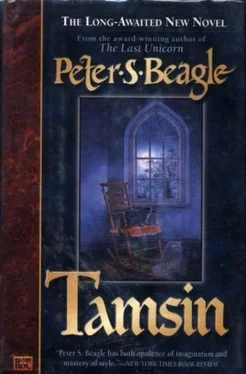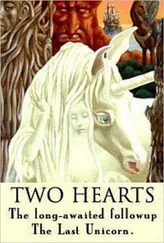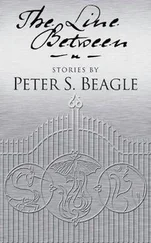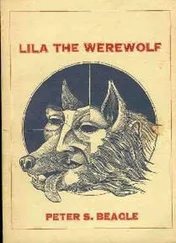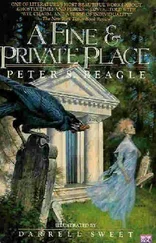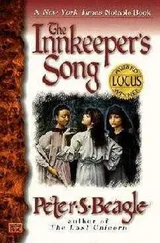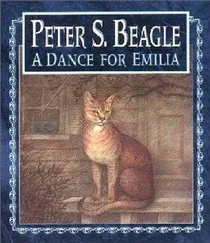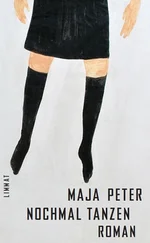Peter Beagle - Tamsin
Здесь есть возможность читать онлайн «Peter Beagle - Tamsin» весь текст электронной книги совершенно бесплатно (целиком полную версию без сокращений). В некоторых случаях можно слушать аудио, скачать через торрент в формате fb2 и присутствует краткое содержание. Год выпуска: 1999, Издательство: ROC, Жанр: Фэнтези, на английском языке. Описание произведения, (предисловие) а так же отзывы посетителей доступны на портале библиотеки ЛибКат.
- Название:Tamsin
- Автор:
- Издательство:ROC
- Жанр:
- Год:1999
- ISBN:нет данных
- Рейтинг книги:3 / 5. Голосов: 1
-
Избранное:Добавить в избранное
- Отзывы:
-
Ваша оценка:
- 60
- 1
- 2
- 3
- 4
- 5
Tamsin: краткое содержание, описание и аннотация
Предлагаем к чтению аннотацию, описание, краткое содержание или предисловие (зависит от того, что написал сам автор книги «Tamsin»). Если вы не нашли необходимую информацию о книге — напишите в комментариях, мы постараемся отыскать её.
Tamsin — читать онлайн бесплатно полную книгу (весь текст) целиком
Ниже представлен текст книги, разбитый по страницам. Система сохранения места последней прочитанной страницы, позволяет с удобством читать онлайн бесплатно книгу «Tamsin», без необходимости каждый раз заново искать на чём Вы остановились. Поставьте закладку, и сможете в любой момент перейти на страницу, на которой закончили чтение.
Интервал:
Закладка:
The funny part is that before we got here Stourhead Farm came that close to being declared an SSSI (Site of Special Scientific Interest), because of one particular species of vole that doesn’t seem to exist anywhere but in this part of West Dorset. Which would have meant the end of Stourhead—you can’t farm an SSSI—but there isn’t a country in the world that has a Strangeness Preserve, so we were all right. Nothing that lives on our land counts as an endangered species.
Since I couldn’t ever know for certain when Tamsin would show up, I always had to go by feeling, and whether I had it right or wrong, it made for some bad moments. Once we were all in the car, bound for a movie in Yeovil, and I backed out at the last minute— literally jumped out on the driveway—because I suddenly just knew that Tamsin was waiting for me. She was, too, that time, but it took a ton of explaining when everybody got home. And when I went out at night—“to stretch my legs,” “to clear my head,” whatever excuse I used—I’d have to deal with Julian at one end, wanting to come with me, and Sally at the other, because she never fell asleep until she knew I was in the house. One time I was on the phone to Meena, and I saw a pale shiver at the window that I was sure had to be Tamsin, and I just cut Meena off—just hung up and ran outside to be with her. But it was some sort of bird, a nightjar, whatever, and I had to call Meena back and apologize. I never did that again, hang up on Meena, even when it was Tamsin.
We covered Stourhead Farm on those walks, Tamsin and I, and sometimes the cats, chasing each other practically under our feet and vanishing again. Tamsin just wafted along beside me like dandelion fluff, like a toy balloon that got away. The truly amazing thing was that she absolutely remembered every field, every crop: She’d say things like, “Ah, you’ve let this meadow go back to rye-grass; my father was forever making trial of the French grasses— lucerne, sainfoin and those.” Or, again, “I vow, Jenny, how wonderful well they do drain in these times of yours. We’d no such pipes and culverts, no such siphon engines—only spades, only ditches filled with stones and bramble. Oh, could my father have seen those pipes !” And she’d actually sigh, and we’d move on. She was a country girl, all right, Tamsin Willoughby, dead or alive.
The sheep weren’t ever aware of her when we’d cross their downland pasture (sheep are barely aware they’re sheep), but she used to scare the hell out of the collie, Albert. Nothing short of foxes threatening a new lamb ever roused that dog; but whenever I passed by with Tamsin, he’d race to head us off, plant his feet and go into an unbelievable frenzy of barking until he actually lost his voice. And that did scare the sheep, so we stopped walking there.
She wanted to know everything about me, about Sally and Evan and the boys—even Norris, even the Lovells. Especially the Lovells, come to think of it—she knew the farm wasn’t in her family anymore, but she didn’t have a clue about the hands and changes it had passed through in the last fifty years. I explained what I could, which wasn’t a lot. Tamsin seemed to understand most of it; but when I started in on the twentieth century, she wasn’t much interested. It took me a while to realize that for all her father’s money, she’d never once been out of Dorset, except for a couple of holidays in Bath; for all her education, Dorset was the world, and all she really cared about was how much Dorset had changed. She said it herself: “Jenny, Jenny, what should I do in this place where I am—stopped—but dream my long dreams of what was? Yet I need to know what is , I must know, if I am ever to—” She broke off right there, and didn’t say anything more for a long time.
I told her the hills were still there, and the butterflies and wildflowers, and the evening fog off the Channel. I talked about dark, soft little coombes like the one where Julian caught his foot in the stream, about barns and cottages that she’d have recognized, and farms where I’d seen horses pulling binding and threshing machines so old that Thomas Hardy probably helped uncrate them. I went into a whole lot of detail about the time Meena and I met a man in the woods making sheep hurdles by hand, weaving split hazel stems together and singing to himself. And I never said a word about plowed-up heathland and air pollution and housing developments on the hills. What for?
“If I could but leap these bounds of mine,” she kept saying. “If I could walk my Dorset but once, one time only, before I pass to… to wherever I should be. Dear and close as it chips me yet, Stourhead is no more my home, nor has been since Edric—”
And she’d quit there, every time, like a record with the needle caught in a scratch. And I’d ask her again who Edric was, and Tamsin either wouldn’t answer or she’d change the subject entirely and tell me how her mother used to make conserves out of rose leaves and sugar, or how her father kept bees. “He would say to me, ‘Catty’—for that was his pet name for me—‘Catty, girl, if a man would be solaced, if he would find respite from daily harassments and grievances, let him observe these creatures at their labor. There’s amnesty for you, there’s plenary absolution for all sins, all sorrows.’ Oh, I do think of him still, Jenny, and I am so sad that the bees are gone.”
Which may all have been her way of keeping me from asking any more questions about Edric—or even the Other One—and if it was, it worked. Ghosts can’t cry, but I about did, every time she remembered something that small from three hundred years ago. The more time we spent together, the more things like that came back to her—just as she herself was growing clearer, easier to see. Her father called her mother “Magpie,” short for Margaret, and the two of them privately called him—roaring Roger Willoughby, the Prodigious Romantic—“Sir Fopling Flutter,” after someone in a play. Her favorite horse was a mare named Elegance; her favorite smell came from the lavender hedges that her mother planted all along the front of the Manor. They’re long gone with the Willoughbys, of course, like her father’s beehives.
She’d had an older sister who died of the Black Plague—the same Black Plague we’d had to study in British History—“and how I failed of catching it, I am sure I do not know, Jenny, for we slept together always. Her name was Maria, so I put it straight into my own name, thinking to make my mother less forlorn. But she grew terrible wroth with me and beat me, which she never did, and bid me not ever use my sister’s name so again. But I kept it anyway.” That one time I thought she remembered tears.
She was looking for someone, I knew that; someone she really especially wanted me to meet. I thought it must be that old friend of hers who’d hopped away through the beech trees, on two legs or four, that first night—the one with the golden eyes. I asked her about it, but she wouldn’t ever say.
Whenever we passed an oak grove—especially Julian’s Hundred Acre Wood—she’d warn me again about oak trees. “It is a thricecut coppice, Jenny, for all these seem virgin. Twice was it cut before my time, and once since, and each time saplings sprang from the stumps with speed uncanny. The old of these parts, they’ve a saying, ‘ Fairy folk are in old oak ,’ and a thrice-cut wood harbors Oakmen, always. Never, Jenny, never step foot under oak after sundown.” She made me promise that one over and over.
Which is why when I first saw the billy-blind I went probably six feet straight up. He wasn’t in any oak grove, but standing on a barrel in the North Barn. He was about the same size as the boggart, but slighter, not as burly. He wore a sort of old-style suit, with an eggplant-colored cravat fluffed around his neck, and a waistcoat to match. No hat, thank God. I don’t think I could have handled a hat. Ankles crossed, one hand in his pocket, bracing the other against the wall—a mini-Jimmy Cagney, Sally’s all-time favorite. Only in the moonlight slanting through the window behind him, he looked more like that English actor who played LongJohn Silver in the old Disney movie. Robert Newton, that’s it.
Читать дальшеИнтервал:
Закладка:
Похожие книги на «Tamsin»
Представляем Вашему вниманию похожие книги на «Tamsin» списком для выбора. Мы отобрали схожую по названию и смыслу литературу в надежде предоставить читателям больше вариантов отыскать новые, интересные, ещё непрочитанные произведения.
Обсуждение, отзывы о книге «Tamsin» и просто собственные мнения читателей. Оставьте ваши комментарии, напишите, что Вы думаете о произведении, его смысле или главных героях. Укажите что конкретно понравилось, а что нет, и почему Вы так считаете.
